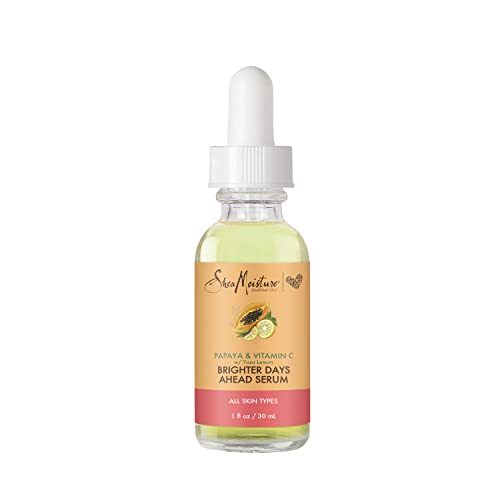
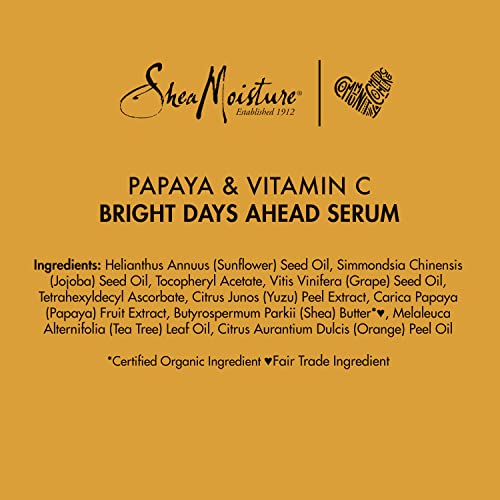
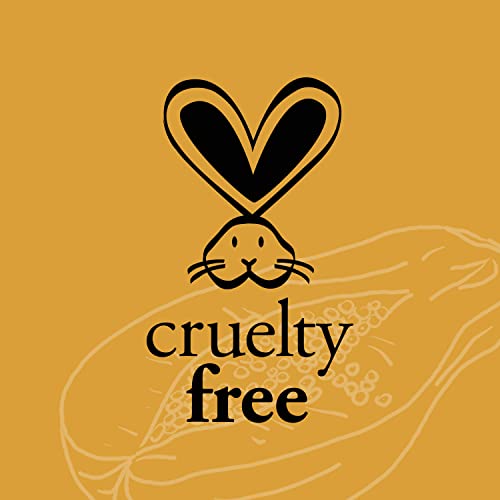
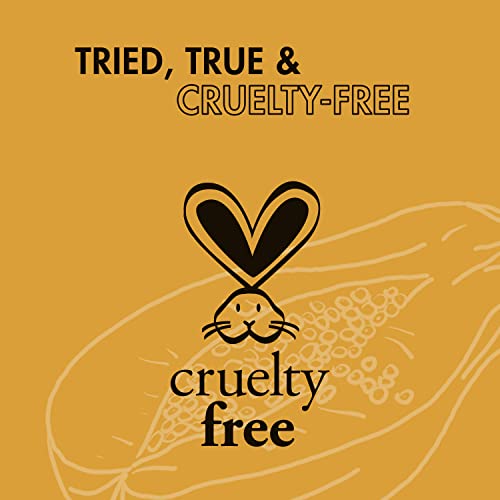

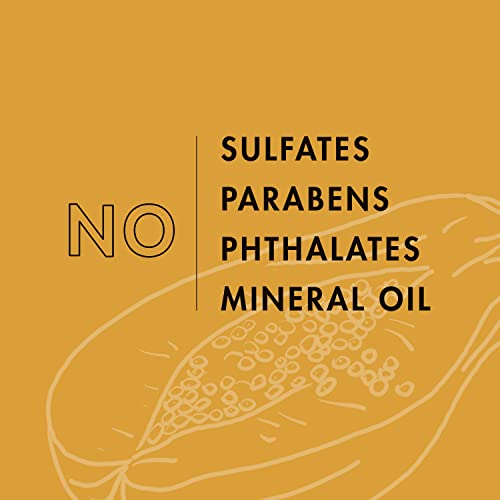
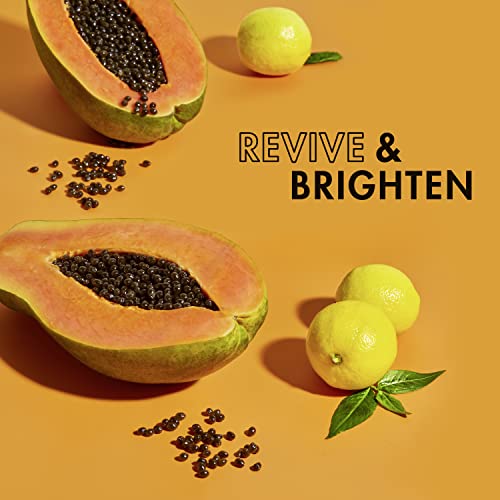
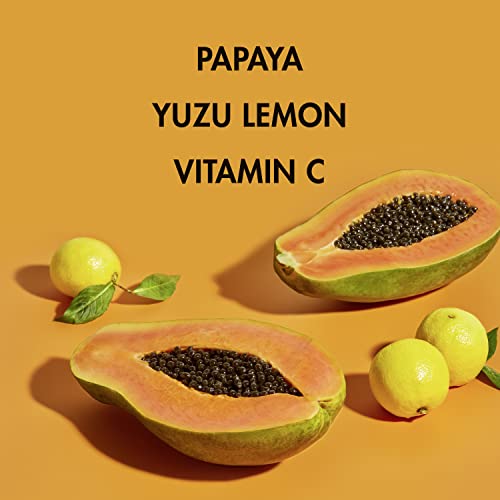
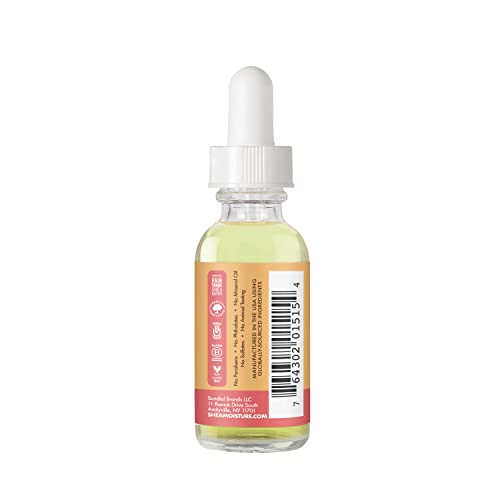
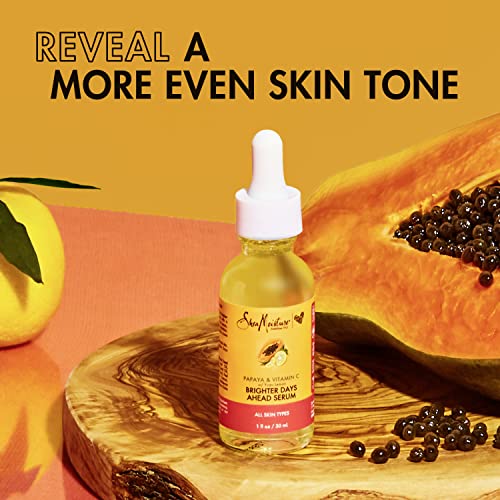
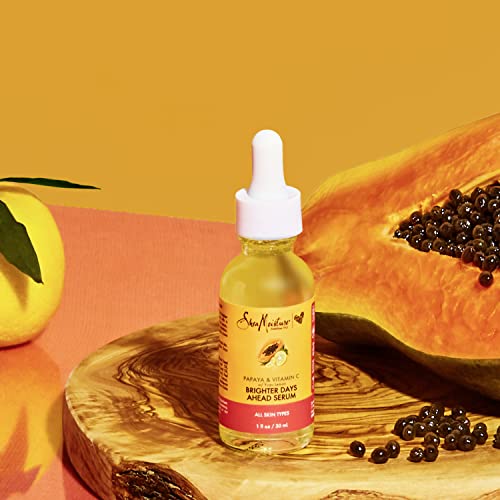
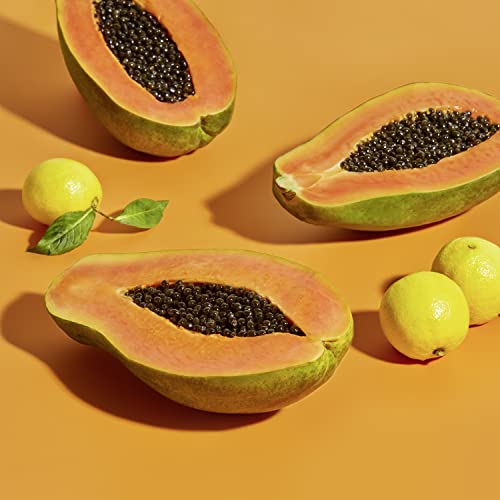
SheaMoisture Face Serum - Hydrating Papaya & Vitamin C for Brighter, Even Skin Tone - 1 oz


Tocopheryl Acetate
Medium RiskTocopheryl acetate is a chemical compound that serves primarily as a form of Vitamin E. It is used in cosmetic and personal care products for its antioxidant properties and to enhance skin stability and moisture.
Sustai Insights
Tocopheryl acetate is valued for its functional benefits, including acting as an antioxidant and skin conditioning agent. It is generally considered to have low carcinogenicity and reproductive toxicity risk, although it poses a moderate concern for allergies. Environmental risks are minimal, with no significant pollutant or bioaccumulation potential noted. Regulatory bodies have not imposed significant restrictions. Safe usage practices should be followed, particularly regarding enhanced skin absorption. Alternatives like natural Vitamin E may provide similar benefits with potentially lower allergenic properties. Overall, this ingredient presents a medium risk assessment.
Citrus Aurantium Dulcis (Orange) Peel Oil
Medium RiskCitrus aurantium dulcis (orange) peel oil is derived from the peel of oranges and is commonly used in cosmetic and personal care products for its fragrance and potential skin benefits. It is known for its aromatic properties and is often included in formulations aimed at enhancing scent profiles.
Sustai Insights
Citrus aurantium dulcis (orange) peel oil offers functional benefits such as providing a pleasant scent and potential antimicrobial properties. However, it poses a high allergy risk and may cause skin irritation in sensitive individuals. Environmental concerns include moderate persistence and potential to contribute to pollution. Regulatory warnings indicate restrictions on use in certain products. Overall, the risk level is assessed as medium, and users are advised to practice caution, particularly those with known allergies. Alternatives like sweet orange essential oil may provide similar benefits with potentially lower risks.
Helianthus Annuus (Sunflower) Seed
Low RiskHelianthus annuus (sunflower) seed is derived from the seeds of the sunflower plant and is commonly used in various cosmetic and personal care products. It serves primarily as an emollient and skin conditioning agent, providing moisture and enhancing the texture of formulations.
Sustai Insights
Helianthus annuus (sunflower) seed offers functional benefits, including skin conditioning and moisturizing properties, while being sustainably sourced and biodegradable. Health risks are minimal, with low concerns for carcinogenicity, allergies, and reproductive toxicity. Environmentally, it presents low risks of pollution or bioaccumulation. Regulatory assessments indicate no current restrictions. Overall, it is considered a low-risk ingredient, and safe usage practices should be maintained. Alternative ingredients may include other plant-based oils, but the sunflower seed oil remains a viable option.
Simmondsia Chinensis (Jojoba)
Low RiskSimmondsia chinensis, commonly known as jojoba, is an oil derived from the seeds of the jojoba plant. It is commonly used in cosmetic formulations for its moisturizing properties, acting as an emollient and skin conditioning agent.
Sustai Insights
Jojoba oil offers functional benefits such as effective skin moisturization and is biodegradable, with sustainable sourcing practices. Health risks are low, with minimal concerns regarding carcinogenicity, allergies, and reproductive toxicity. Environmental impact is negligible, with no pollutant or bioaccumulation potential. Regulatory status is favorable with no significant restrictions noted. Overall, it is assessed as low risk, and safe usage practices should be maintained. Alternatives include other plant-derived oils like argan or almond oil, which may provide similar benefits.
Butyrospermum Parkii (Shea) Butter
Low RiskButyrospermum parkii (shea) butter is a vegetable fat derived from the nuts of the shea tree. It is commonly used in cosmetic formulations for its emollient properties, providing moisture and improving skin texture. Additionally, shea butter is known for its ability to enhance the stability of products and deliver a creamy texture.
Sustai Insights
Shea butter offers functional benefits as an effective moisturizer, enhancing skin barrier function and texture. It is sustainably sourced and biodegradable, contributing to eco-friendliness. Health-wise, it is associated with low risks for carcinogenicity, allergies, and reproductive toxicity. Environmental impacts are minimal, with no significant pollutant potential identified. Regulatory assessments indicate no current restrictions. Overall, the ingredient presents a low risk, making it a favorable choice in cosmetic formulations.
Carica Papaya (Papaya) Fruit Extract
Low RiskCarica papaya (papaya) fruit extract is an ingredient derived from the fruit of the papaya plant, primarily known for its enzymatic properties. It is commonly used in cosmetic formulations for its potential exfoliating and moisturizing effects, contributing to skin care products aimed at improving skin texture.
Sustai Insights
Carica papaya fruit extract offers functional benefits such as exfoliation and hydration due to its natural enzymes, which can enhance skin texture. It is typically sustainably sourced and biodegradable. Health risks are minimal, with low concerns for carcinogenicity, allergies, or reproductive toxicity. Environmental impacts are not significant, and regulatory bodies do not impose restrictions on its use. Overall, the ingredient is considered low risk, making it a safe choice in cosmetic formulations.
Tetrahexyldecyl Ascorbate
Low RiskTetrahexyldecyl ascorbate is an ester of hexyl ascorbic acid, a stable form of vitamin C, commonly used in cosmetic formulations for its antioxidant properties. It is employed to improve skin appearance, enhance radiance, and provide photoprotection.
Sustai Insights
Tetrahexyldecyl ascorbate offers functional benefits as an antioxidant, promoting skin health and appearance. It is generally regarded as safe, with low concerns for carcinogenicity, allergies, and irritation. Although it poses minimal environmental risks, regulatory bodies have outlined specific usage guidelines. Overall, its risk level is assessed as low, making it a viable option in cosmetic formulations.
Citrus Junos
Low RiskCitrus junos, commonly known as yuzu, is a citrus fruit primarily used for its aromatic zest and juice in culinary applications and cosmetics. It serves various functions, including flavoring agents in food and fragrance components in personal care products.
Sustai Insights
Citrus junos offers functional benefits such as flavor enhancement and fragrance, contributing to product appeal. It is generally regarded as low risk concerning health concerns, including cancer, allergies, and reproductive toxicity. Environmental impact is minimal, with no significant pollutant or bioaccumulation issues reported. Regulatory bodies do not impose restrictions on its use. Safe usage practices should be followed, although there are no specific advisories. Alternatives to consider include other citrus extracts that offer similar benefits. Overall, the ingredient is assessed as low risk.
Vitis Vinifera (Grape) Seed Oil
Low RiskVitis vinifera (grape) seed oil is derived from the seeds of grapes, primarily used in cosmetics for its emollient properties. It acts as a moisturizer and is often included in formulations for skin care products due to its fatty acid composition and antioxidant potential.
Sustai Insights
Grape seed oil provides functional benefits as an effective moisturizer and antioxidant, contributing to skin hydration and protection. It is sustainably sourced and biodegradable. Health risks are low, with minimal concerns regarding carcinogenicity, allergies, or reproductive toxicity. Environmental impact is also low, with no significant pollutant potential. Regulatory bodies do not impose restrictions on its use. Overall, the ingredient poses a low risk, making it a safe choice in cosmetic formulations.
Melaleuca Alternifolia (Tea Tree)
Low RiskMelaleuca alternifolia, commonly known as tea tree, is an unspecified preparation derived from the leaves of the tea tree. It is primarily used for its antiseptic properties and is found in various personal care products.
Sustai Insights
Tea tree oil offers functional benefits such as antimicrobial properties, making it effective in skincare formulations. It is considered to have low health risks, including low concerns for carcinogenicity, allergies, and reproductive toxicity. Environmental risks are minimal, with no significant pollutant or bioaccumulation potential. Regulatory bodies have noted no major advisories, and overall risk assessment remains low. For safe usage, it is recommended to use appropriate concentrations and consider alternatives like lavender or eucalyptus oil for similar benefits.
Tocopheryl Acetate
Medium RiskTocopheryl acetate is a chemical compound that serves primarily as a form of Vitamin E. It is used in cosmetic and personal care products for its antioxidant properties and to enhance skin stability and moisture.
Sustai Insights
Tocopheryl acetate is valued for its functional benefits, including acting as an antioxidant and skin conditioning agent. It is generally considered to have low carcinogenicity and reproductive toxicity risk, although it poses a moderate concern for allergies. Environmental risks are minimal, with no significant pollutant or bioaccumulation potential noted. Regulatory bodies have not imposed significant restrictions. Safe usage practices should be followed, particularly regarding enhanced skin absorption. Alternatives like natural Vitamin E may provide similar benefits with potentially lower allergenic properties. Overall, this ingredient presents a medium risk assessment.
Helianthus Annuus (Sunflower) Seed
Low RiskHelianthus annuus (sunflower) seed is derived from the seeds of the sunflower plant and is commonly used in various cosmetic and personal care products. It serves primarily as an emollient and skin conditioning agent, providing moisture and enhancing the texture of formulations.
Sustai Insights
Helianthus annuus (sunflower) seed offers functional benefits, including skin conditioning and moisturizing properties, while being sustainably sourced and biodegradable. Health risks are minimal, with low concerns for carcinogenicity, allergies, and reproductive toxicity. Environmentally, it presents low risks of pollution or bioaccumulation. Regulatory assessments indicate no current restrictions. Overall, it is considered a low-risk ingredient, and safe usage practices should be maintained. Alternative ingredients may include other plant-based oils, but the sunflower seed oil remains a viable option.
Simmondsia Chinensis (Jojoba)
Low RiskSimmondsia chinensis, commonly known as jojoba, is an oil derived from the seeds of the jojoba plant. It is commonly used in cosmetic formulations for its moisturizing properties, acting as an emollient and skin conditioning agent.
Sustai Insights
Jojoba oil offers functional benefits such as effective skin moisturization and is biodegradable, with sustainable sourcing practices. Health risks are low, with minimal concerns regarding carcinogenicity, allergies, and reproductive toxicity. Environmental impact is negligible, with no pollutant or bioaccumulation potential. Regulatory status is favorable with no significant restrictions noted. Overall, it is assessed as low risk, and safe usage practices should be maintained. Alternatives include other plant-derived oils like argan or almond oil, which may provide similar benefits.
Butyrospermum Parkii (Shea) Butter
Low RiskButyrospermum parkii (shea) butter is a vegetable fat derived from the nuts of the shea tree. It is commonly used in cosmetic formulations for its emollient properties, providing moisture and improving skin texture. Additionally, shea butter is known for its ability to enhance the stability of products and deliver a creamy texture.
Sustai Insights
Shea butter offers functional benefits as an effective moisturizer, enhancing skin barrier function and texture. It is sustainably sourced and biodegradable, contributing to eco-friendliness. Health-wise, it is associated with low risks for carcinogenicity, allergies, and reproductive toxicity. Environmental impacts are minimal, with no significant pollutant potential identified. Regulatory assessments indicate no current restrictions. Overall, the ingredient presents a low risk, making it a favorable choice in cosmetic formulations.
Carica Papaya (Papaya) Fruit Extract
Low RiskCarica papaya (papaya) fruit extract is an ingredient derived from the fruit of the papaya plant, primarily known for its enzymatic properties. It is commonly used in cosmetic formulations for its potential exfoliating and moisturizing effects, contributing to skin care products aimed at improving skin texture.
Sustai Insights
Carica papaya fruit extract offers functional benefits such as exfoliation and hydration due to its natural enzymes, which can enhance skin texture. It is typically sustainably sourced and biodegradable. Health risks are minimal, with low concerns for carcinogenicity, allergies, or reproductive toxicity. Environmental impacts are not significant, and regulatory bodies do not impose restrictions on its use. Overall, the ingredient is considered low risk, making it a safe choice in cosmetic formulations.
Tetrahexyldecyl Ascorbate
Low RiskTetrahexyldecyl ascorbate is an ester of hexyl ascorbic acid, a stable form of vitamin C, commonly used in cosmetic formulations for its antioxidant properties. It is employed to improve skin appearance, enhance radiance, and provide photoprotection.
Sustai Insights
Tetrahexyldecyl ascorbate offers functional benefits as an antioxidant, promoting skin health and appearance. It is generally regarded as safe, with low concerns for carcinogenicity, allergies, and irritation. Although it poses minimal environmental risks, regulatory bodies have outlined specific usage guidelines. Overall, its risk level is assessed as low, making it a viable option in cosmetic formulations.
Citrus Junos
Low RiskCitrus junos, commonly known as yuzu, is a citrus fruit primarily used for its aromatic zest and juice in culinary applications and cosmetics. It serves various functions, including flavoring agents in food and fragrance components in personal care products.
Sustai Insights
Citrus junos offers functional benefits such as flavor enhancement and fragrance, contributing to product appeal. It is generally regarded as low risk concerning health concerns, including cancer, allergies, and reproductive toxicity. Environmental impact is minimal, with no significant pollutant or bioaccumulation issues reported. Regulatory bodies do not impose restrictions on its use. Safe usage practices should be followed, although there are no specific advisories. Alternatives to consider include other citrus extracts that offer similar benefits. Overall, the ingredient is assessed as low risk.
Vitis Vinifera (Grape) Seed Oil
Low RiskVitis vinifera (grape) seed oil is derived from the seeds of grapes, primarily used in cosmetics for its emollient properties. It acts as a moisturizer and is often included in formulations for skin care products due to its fatty acid composition and antioxidant potential.
Sustai Insights
Grape seed oil provides functional benefits as an effective moisturizer and antioxidant, contributing to skin hydration and protection. It is sustainably sourced and biodegradable. Health risks are low, with minimal concerns regarding carcinogenicity, allergies, or reproductive toxicity. Environmental impact is also low, with no significant pollutant potential. Regulatory bodies do not impose restrictions on its use. Overall, the ingredient poses a low risk, making it a safe choice in cosmetic formulations.
Citrus Aurantium Dulcis (Orange) Peel Oil
Medium RiskCitrus aurantium dulcis (orange) peel oil is derived from the peel of oranges and is commonly used in cosmetic and personal care products for its fragrance and potential skin benefits. It is known for its aromatic properties and is often included in formulations aimed at enhancing scent profiles.
Sustai Insights
Citrus aurantium dulcis (orange) peel oil offers functional benefits such as providing a pleasant scent and potential antimicrobial properties. However, it poses a high allergy risk and may cause skin irritation in sensitive individuals. Environmental concerns include moderate persistence and potential to contribute to pollution. Regulatory warnings indicate restrictions on use in certain products. Overall, the risk level is assessed as medium, and users are advised to practice caution, particularly those with known allergies. Alternatives like sweet orange essential oil may provide similar benefits with potentially lower risks.
Melaleuca Alternifolia (Tea Tree)
Low RiskMelaleuca alternifolia, commonly known as tea tree, is an unspecified preparation derived from the leaves of the tea tree. It is primarily used for its antiseptic properties and is found in various personal care products.
Sustai Insights
Tea tree oil offers functional benefits such as antimicrobial properties, making it effective in skincare formulations. It is considered to have low health risks, including low concerns for carcinogenicity, allergies, and reproductive toxicity. Environmental risks are minimal, with no significant pollutant or bioaccumulation potential. Regulatory bodies have noted no major advisories, and overall risk assessment remains low. For safe usage, it is recommended to use appropriate concentrations and consider alternatives like lavender or eucalyptus oil for similar benefits.
Discover brighter, healthier skin with SheaMoisture's Papaya and Vitamin C Serum, designed for all skin types. This lightweight formula combines the nourishing power of papaya and yuzu lemon to hydrate and enhance your natural glow.
- Brightening and Hydrating: This serum helps to brighten skin tone and deliver essential moisture for a radiant complexion.
- Versatile Usage: Ideal for both day and night, this serum can be easily integrated into your daily skincare routine, providing continuous benefits around the clock.
- Natural Ingredients: Formulated with natural oils and extracts, including sunflower seed oil and shea butter, for effective hydration without harsh chemicals.
- Easy Application: Simply cleanse, apply a few drops, and massage into the skin for quick absorption—perfect for busy lifestyles.
- Sustainably Sourced: SheaMoisture is committed to ethical sourcing and sustainability, supporting communities while providing high-quality skincare solutions.
Subscribe & Save with Sustai
- Best Price Guarantee: Always enjoy the lowest prices on sustainable home essentials.
- No Surprises: We’ll notify you before shipping. No hidden fees, ever.
- You’re in Charge: Change, pause, or cancel your subscription anytime with ease.
- Eco-Friendly Deliveries: Our grouped shipments mean less packaging and lower emissions.
Join us on a sustainable journey. Special offers for a limited time! Prices and promotions may change.
Recommended Products
Discover brighter, healthier skin with SheaMoisture's Papaya and Vitamin C Serum, designed for all skin types. This lightweight formula combines the nourishing power of papaya and yuzu lemon to hydrate and enhance your natural glow.
- Brightening and Hydrating: This serum helps to brighten skin tone and deliver essential moisture for a radiant complexion.
- Versatile Usage: Ideal for both day and night, this serum can be easily integrated into your daily skincare routine, providing continuous benefits around the clock.
- Natural Ingredients: Formulated with natural oils and extracts, including sunflower seed oil and shea butter, for effective hydration without harsh chemicals.
- Easy Application: Simply cleanse, apply a few drops, and massage into the skin for quick absorption—perfect for busy lifestyles.
- Sustainably Sourced: SheaMoisture is committed to ethical sourcing and sustainability, supporting communities while providing high-quality skincare solutions.

You can have at most 2 Sustainable Steals products in your cart
Customer Reviews
Customers’ View
Customers appreciate the moisturizing and brightening effects of SheaMoisture's Papaya and Vitamin C Serum, noting that it enhances their skin's appearance and leaves a healthy glow. Many users highlight the serum's lightweight texture, making it suitable for various skin types, and commend its pleasant scent, which adds to their overall experience. Positive feedback includes remarks on the product's effectiveness in evening skin tone and providing hydration, with several users mentioning the good value for money it offers. However, some concerns were raised about the product's oiliness and the absence of a seal on the packaging. Overall, customers see this serum as a beneficial addition to their skincare routine, aligning well with their eco-conscious values due to its natural ingredients.
AI-generated from the text of customer reviewsThis product is rated 4.7 of 5.0 stars.
It has received 39 reviews.




